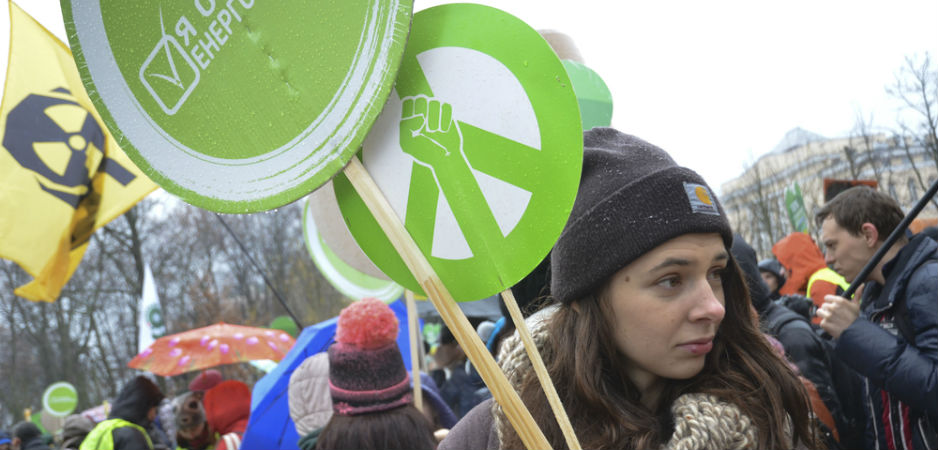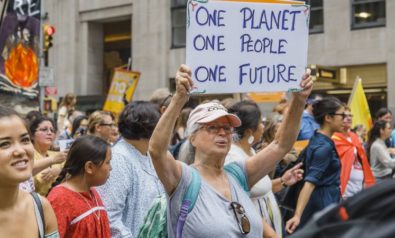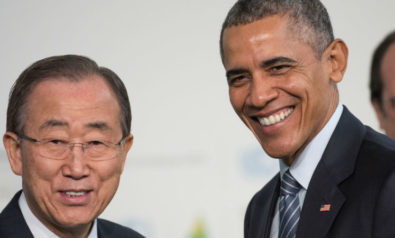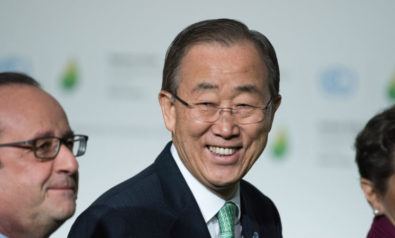COP21 aims to end a four-year impasse. But the climate talks are sponsored by companies without an interest in climate protection.
In 2013, when world leaders met in Warsaw, negotiations over a new climate treaty had already been ongoing for two years. The 19th session of the Conference of Parties (COP19) has often been called “the worst COP ever.” This had several reasons: the emission reductions target was lower than before the climate discussions began; the World Coal Summit took place in Warsaw during the climate talks; and the Polish prime minister fired his environmental minister.
The talks were also heavily sponsored by companies having no interest in climate protection. At one point, those working in civil society had enough. They said, “Polluters talk, we walk.” And so they walked out of the negotiations.
Since November 30, 2015, leaders from countries across the world have gathered in Paris to negotiate a new climate treaty. The 21st session of the Conference of Parties (COP21) aims to bring an end to a four-year-long negotiating process. But once again, the talks are sponsored by different companies.
Corporate Accountability released a revealing report on November 30. Dubbed “Fueling the Fire: The Corporate Sponsors Bankrolling COP21,” it shows that Engie, EDF, Suez Environment and BNP Paribas are responsible for more than 200 megatons of CO2 per year. These four firms are leading sponsors of COP21.
Their activities are broad, but are often yielded in the sector of fossil energy. These include fracking for shale gas in the United Kingdom, investments in tar sands exploration in Canada, and the usage of more than 46 coal-fired power plants around the world. EDF has announced that it will stop financing its solar power-affiliated company, Nexcis, but it still continues to support nuclear power. And BNP Paribas has invested more than €15 billion in the coal sector since 2005. In 2014, Engie emitted more than 131 megatons of carbon dioxide.
The aim of COP21 is the “stabilization of greenhouse gas concentrations in the atmosphere at a level that would prevent dangerous anthropogenic interference with the climate system.” Rising global emissions are in opposition to this aim. Financial interests in fossil fuels have, therefore, raised major concerns among civil society.
According to Patti Lynn, executive director of Corporate Accountability International, the decision to allow these firms to sponsor COP21 is “akin to hiring a fox to guard a hen house.” She added that the United Nations climate talks were at risk of becoming “corporate tradeshows for false market-based solutions.”
The report by Corporate Accountability International suggests that fossil fuel corporations have questionable policy interference.
Business Europe is the umbrella group for national employers’ organizations as well as big corporations such as EDF, ExxonMobile, Shell and many more. In Europe, it is one of the most powerful business lobbies. The group has worked against the “market deployment of energy produced from renewable sources.”
No Space in Climate Policymaking
Fossil fuel companies can be part of official country delegations. According to a report by Polaris Institute, they can provide input till the last minute of negotiations and, therefore, ensure an impactful representation of their interests. This also allows them access to most meetings—excluding high-level ones, which only ministers and senior officials have access—and documents. Therefore, these firms have the opportunity to work from the inside with few restrictions.
Jakpor from Environmental Rights Action Nigeria argues that there is a need to “protect climate policymaking from those who wish to undermine it.”
The report by Corporate Accountability International concludes with an idea from the World Health Organization’s Framework Convention on Tobacco Control. In this convention, the tobacco industry has been denied access to policymakers for over a decade ago.
In May, more than 60 organizations launched a global campaign to do just that. The campaign called on big polluters to be kicked out of climate policymaking—it has more than half a million signatories so far. But with an announcement by 350.org of $3.4 trillion being divested so far and discussion over de-carbonization, are we any closer to the end of the fossil fuels era?
The views expressed in this article are the author’s own and do not necessarily reflect Fair Observer’s editorial policy.
Photo Credit: Furyk Nazar / Shutterstock.com
 We bring you perspectives from around the world. Help us to inform and educate. Your donation is tax-deductible. Join over 400 people to become a donor or you could choose to be a sponsor.
We bring you perspectives from around the world. Help us to inform and educate. Your donation is tax-deductible. Join over 400 people to become a donor or you could choose to be a sponsor.
Support Fair Observer
We rely on your support for our independence, diversity and quality.
For more than 10 years, Fair Observer has been free, fair and independent. No billionaire owns us, no advertisers control us. We are a reader-supported nonprofit. Unlike many other publications, we keep our content free for readers regardless of where they live or whether they can afford to pay. We have no paywalls and no ads.
In the post-truth era of fake news, echo chambers and filter bubbles, we publish a plurality of perspectives from around the world. Anyone can publish with us, but everyone goes through a rigorous editorial process. So, you get fact-checked, well-reasoned content instead of noise.
We publish 2,500+ voices from 90+ countries. We also conduct education and training programs
on subjects ranging from digital media and journalism to writing and critical thinking. This
doesn’t come cheap. Servers, editors, trainers and web developers cost
money.
Please consider supporting us on a regular basis as a recurring donor or a
sustaining member.
Will you support FO’s journalism?
We rely on your support for our independence, diversity and quality.





























